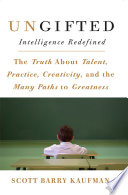

In 'Ungifted', the author, Scott Barry Kaufman, challenges the traditional notions of intelligence that often prioritize IQ scores and standardized testing. He argues that intelligence is not a fixed trait but a dynamic and multifaceted construct that encompasses a variety of abilities, talents, and potential. Kaufman posits that everyone possesses unique strengths that may not be captured by conventional measures of intelligence. This perspective encourages a broader understanding of what it means to be smart, emphasizing creativity, emotional intelligence, and practical problem-solving skills. By redefining intelligence, Kaufman invites readers to appreciate diverse talents and encourages educational systems to nurture these various forms of intelligence rather than merely focusing on academic performance.
Continue reading'Ungifted' emphasizes the importance of passion and intrinsic motivation in achieving success. Kaufman argues that while innate abilities can play a role in one's achievements, it is often the drive and enthusiasm for a subject that leads to mastery. He cites research showing that individuals who are passionate about their interests tend to work harder, persist longer in the face of challenges, and ultimately achieve greater success than those who rely solely on their natural gifts. This idea serves as a reminder that cultivating a love for learning and encouraging curiosity can be more impactful than simply focusing on talent. Kaufman advocates for educational environments that foster passion and creativity, allowing students to explore their interests deeply.
Continue readingKaufman discusses the concept of a growth mindset, which is the belief that abilities and intelligence can be developed through dedication and hard work. This idea contrasts with a fixed mindset, where individuals believe their talents are static. In 'Ungifted', Kaufman highlights the significance of adopting a growth mindset in both educational settings and personal development. He argues that individuals who embrace this mindset are more likely to take on challenges, learn from criticism, and ultimately achieve their goals. By fostering a growth mindset, educators and parents can help students overcome obstacles and develop resilience, which is crucial for long-term success.
Continue readingKaufman explores how external factors, such as family, community, and culture, influence an individual's development and opportunities. He emphasizes that while personal traits and abilities are important, the environment plays a crucial role in shaping a person's potential. 'Ungifted' discusses how supportive environments can nurture talent and creativity, while negative or restrictive environments can stifle growth. Kaufman advocates for creating inclusive and supportive educational systems that recognize and respond to the diverse needs of students, allowing them to thrive regardless of their background or initial abilities.
Continue readingIn 'Ungifted', Kaufman highlights the importance of embracing diverse perspectives in education and society. He argues that a diversity of thought leads to richer discussions, more innovative solutions, and a deeper understanding of complex issues. Kaufman encourages educators to create environments where students feel valued for their unique contributions, fostering collaboration and creativity. By recognizing and celebrating diversity, we can cultivate a culture of inclusion that empowers individuals to express themselves and share their ideas, ultimately benefiting society as a whole.
Continue readingKaufman discusses the balance between structured learning and the freedom to explore one's interests. He argues that while some degree of structure is necessary for effective education, too much rigidity can stifle creativity and motivation. 'Ungifted' advocates for educational approaches that allow students to pursue their passions while still providing guidance and support. Kaufman suggests that educators should create a flexible learning environment that encourages exploration and experimentation, allowing students to take ownership of their learning journey.
Continue readingKaufman emphasizes the significance of emotional intelligence (EQ) in personal and professional success. He argues that skills such as empathy, self-regulation, and social awareness are just as important as cognitive abilities. In 'Ungifted', Kaufman discusses how emotional intelligence can enhance relationships, improve communication, and foster collaboration. He encourages readers to develop their emotional intelligence through self-reflection and practice, recognizing that these skills can greatly impact one's ability to navigate challenges and connect with others.
Continue readingThe reading time for Ungifted depends on the reader's pace. However, this concise book summary covers the 7 key ideas from Ungifted, allowing you to quickly understand the main concepts, insights, and practical applications in around 21 min.
Ungifted is definitely worth reading. The book covers essential topics including Redefining Intelligence, The Role of Passion and Motivation, The Importance of a Growth Mindset, providing practical insights and actionable advice. Whether you read the full book or our concise summary, Ungifted delivers valuable knowledge that can help you improve your understanding and apply these concepts in your personal or professional life.
Ungifted was written by Scott Barry Kaufman.
If you enjoyed Ungifted by Scott Barry Kaufman and want to explore similar topics or deepen your understanding, we highly recommend these related book summaries:
These books cover related themes, complementary concepts, and will help you build upon the knowledge gained from Ungifted. Each of these summaries provides concise insights that can further enhance your understanding and practical application of the ideas presented in Ungifted.